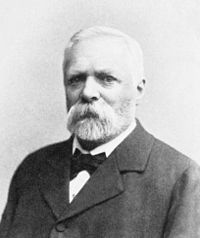|
Carl von Voit
Carl von Voit (31 October 1831 – 31 January 1908) was a German physiologist and dietitian. BiographyVoit was born in Amberg, the son of August von Voit and Mathilde Burgett. From 1848 to 1854 he studied at the universities of Munich and Würzburg. At Munich, his teachers were Justus von Liebig and Max Joseph Pettenkofer, and at Würzburg, he was a pupil of Albert von Kölliker. In 1855 he furthered his education at the University of Göttingen under chemist Friedrich Wohler, and in 1856/57 served as an assistant to Theodor von Bischoff in Munich. In 1857, he obtained his habilitation, and from 1863 was a full professor of physiology, as well as curator of the physiological collection at the University of Munich.[1] ContributionsCarl von Voit is considered by many to be the "father" of modern dietetics. As a chemist and physiologist, he found that the amount of nitrogen in excreted urea is a measure for the protein turnover. Using a respiration chamber, he could characterize the significance of individual nutrients, known as Voitsche Kostmaß. He was also a successful teacher, attracting international students to the University of Munich and thus significantly influencing the US nutritionist, among others. One of his better known German pupils was Max Rubner. Personal lifeIn 1860, Voit married Laura von Hößlin (1831-1910) in Augsburg. She was the younger sister of his stepmother Ottilie. They had six children Karoline (b. 1862), Friedrich (1863–1944), Emilie (1864-1903; married name Steinheil), Bertha (b. 1866), Louise Auguste (b. 1868) and Johanna (b. 1870).[2] His grand daughter via Emilie was Elsbeth Steinheil, the first German woman to graduate in mechanical engineering, qualifying in 1917 from the Technical University of Munich.[3] Carl von Voit died in Munich on 31 January 1908. The German Nutrition Society has been awarding the Carl-von-Voit-medal since 1961. Works
References
External links
|
||||||||||||||||||||
Portal di Ensiklopedia Dunia
